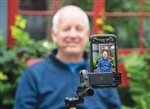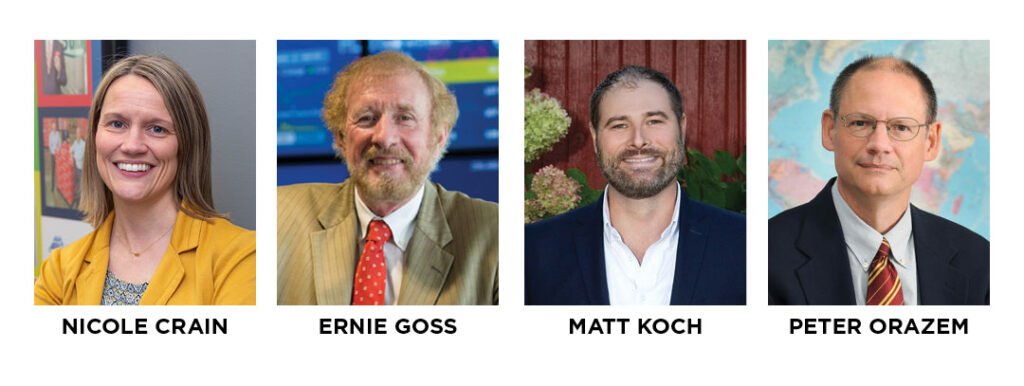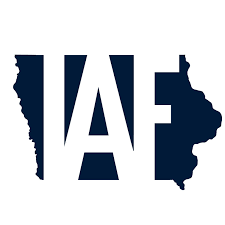‘A shift in focus’: How Des Moines tourist attractions are continuing to stay relevant

EMILY BLOBAUM Apr 30, 2020 | 8:21 pm
7 min read time
1,558 wordsArts and Culture, Business Record Insider
The gates, doors and windows of Des Moines-area attractions all say the same thing: closed.
But the animals at the Blank Park Zoo are still being fed. The plants at the Greater Des Moines Botanical Garden are still being watered. The Foucault Pendulum at the Science Center of Iowa is still swinging. The Polk County Conservation trails at Jester Park remain open. The sculptures and paintings at the Des Moines Art Center are still being monitored.
Yet nearly everything else about what these organizations are doing has shifted.
In order to continue carrying out missions of being resources of education, recreation and exploration for the community, these organizations have all turned to social media to continue providing virtual programming.
Here’s a look at how they’ve done it.
Greater Des Moines Botanical Garden
In terms of a strategy to stay relevant, perhaps the Greater Des Moines Botanical Garden’s can be summed up in a quote posted on its Facebook page on March 19: Never underestimate the healing power of a quiet moment in the garden.
Many studies have shown that spending time in nature has numerous benefits. Doing so can lower blood pressure, help with depression and anxiety, and reduce stress. Mental health experts have said this is even more important now.
Normally, the Botanical Garden prides itself on being a space for people to reap those benefits while learning about the variety of plants within its spaces.
But after closing its doors on March 16 in response to the COVID-19 pandemic, the question of how the garden could continue to provide that experience to the public when people can’t come and visit became one that Kelly Norris, director of horticulture and education, was tasked with solving.
“Our business model is largely predicated on people coming to this place, and so one of the things we’re talking about as a leadership team is … how can we find ways to create an economic model for the institution long-term around [providing information, knowledge and content],” Norris said.
So far, his team has found that posting live videos on social media has been successful.
“We’ve probably done more video in the last three weeks than we’ve done in the three months before,” Norris said.
Norris and his team have published more than a dozen Facebook Live videos in the past month. In addition to hosting short tours of the gardens, the Botanical Garden has also been hosting live meditation sessions every week.
For 20 minutes every Monday morning, Dennis Kelly, a well-respected meditation instructor within the Des Moines community, guides viewers through meditation on Facebook Live.
Norris hopes that by posting photos and videos of plants on social media, the Botanical Garden can provide its audience a brief moment of calm and reprieve from the world right now.
“I think it’s about bringing people back to what’s important. Slow down, calm down and stop to smell the roses,” David Regan, assistant director of retail and guest experience, added.
Polk County Conservation
Polk County Conservation naturalists Heidi Anderson and Nikki Dunbar are used to speaking with busloads of kids about insects, birds, snakes, fish, plants and the night sky.
But taking those programs and presenting them through a phone? That took some getting used to.
Under normal circumstances, Anderson and Dunbar are able to get immediate feedback from their audiences. They can tell if people are bored or interested and can respond to questions right away. They can clarify answers.
That’s not possible through Facebook Live, a platform that Polk County Conservation has used several times in the past weeks to continue its educational programming.
“If you accidentally misspeak, you can’t go back and correct it. There’s more pressure to be as accurate and concise as possible, and you don’t want to ramble on,” Dunbar said. “It also forces me to watch myself [afterward] and change things that I think are a problem, like nervous tics.”
Other learning curves included adjusting their speaking volume, making eye contact with the camera and knowing which spaces within Jester Park Nature Center have the strongest Wi-Fi signals.
But feedback has been overwhelmingly positive.
With schools canceled for the remainder of the spring, the appetite for educational programming has increased dramatically. Comments from parents saying “thank you for doing this” have poured in.
Polk County Conservation has posted 14 live programs since March 17, with topics about seeds, beavers, owls, geocaching, the moon, fish, rocks and more on the Jester Park Nature Center Facebook page. And while they’ve since put a pause on doing daily programming through live video, Dunbar and Anderson can see themselves continuing doing virtual programming on occasion in the future.
Blank Park Zoo
Usually, this would be the beginning of the busy season for the Blank Park Zoo, particularly for the education department.
Hundreds of programs that the 10-person team normally presents to libraries, schools and senior centers in all 99 counties every summer have had to shift online.
Fortunately for the zoo, the transition to move all programming online and ramp up social media efforts has felt almost effortless in that they already had the team, equipment and expertise on hand.
Led by Chief Marketing Officer Ryan Bickel, the zoo has managed to post something different every day through its #ClosedButStillCaring and #BringingTheZooToYou campaigns.
Bickel was able to incorporate animal enclosure webcams that were already installed in animal enclosures into the regular social media lineup.
Cameras typically used for monitoring lions, Japanese macaques, red pandas, giraffes and other animals were able to be rigged to stream live on Facebook.
“We’ve done some tests before but we thought this was the perfect time to debut [the livestreams], and people have responded well,” Bickel said.
Additionally, every weekday, the zoo’s education team hosts either an Education Station (a series introducing one of the 50 animals in the education department) or a Zoo Creates (a series of crafts or snacks to easily make at home with an occasional surprise animal guest at the end) through Facebook Live.
“Everyone has been thankful that we’re giving people something educational to do,” Bickel said.
Des Moines Art Center
When the Des Moines Art Center announced its closure to its board of directors in March, Jason Gross, an Art Center board member and vice president of innovation at EMC Insurance Cos., brought up a secret weapon in his arsenal: a Matterport system that EMC normally uses to scan spaces when filing claims.
He asked if the system was something the Art Center would be interested in using to create a virtual tour of its galleries.
“After I picked my jaw up off the floor … [the answer was] yes,” Jordan Powers, director of marketing and public relations, said. “This has been a dream of mine for a long time.”
Ten days later, Powers and Gross spent seven hours scanning gallery spaces throughout the Art Center’s three buildings, ending up with 436 individual scans.
Powers described the partnership as an amazing combination of timing and resources.
“We’re forever grateful that out of the darkness and uncertainty of the current moment that we’re in, we’ve had this opportunity.”
In the 19 days following the launch of the virtual tour, 3,313 people clicked through the tour, or roughly 174 per day. That’s comparable to the museum’s usual, in-person traffic numbers of 140 visitors per weekday and 233 on weekends.
“For a closed museum, it’s pretty awesome that in 19 days we had nearly 3,500 visitors,” Powers said.
The plan is to keep the virtual tour up after the pandemic.
“A huge component of our mission is to provide transformative art experiences,” Powers said. “And a large portion of that is accessibility. We have our art center lovers that come here no matter what, but there are people that will never be able to make it here. To have the ability to still ‘walk through our galleries’ and see our collections is really important to us.”
Science Center of Iowa
If you were to walk by the Science Center of Iowa, you would see a series of posters hanging on its front windows with information about the makeup of the coronavirus, how it spreads and what you can do to avoid it.
As an organization dedicated to science education, the Science Center feels a duty to keep the public informed about the COVID-19 pandemic.
On its social media platforms, the Science Center has retweeted and shared posts about the science behind why people panic-buy toilet paper, social distancing advice from astronauts and a demonstration that visualizes how far sneezes travel.
And within its walls is a small science learning team that is producing daily virtual programming for its “Go Beyond with SCI” initiative. Not limited to coronavirus-related content, the initiative aims to provide a wide variety of virtual learning resources for families to use.
Each weekday features a different theme: Mondays feature an item or experiment you can make at home, Tuesdays showcase what’s happening behind the scenes at the Science Center, Wednesdays are dedicated to space content, Thursdays are for exploring what’s outside your window, and Fridays spotlight various programs.
“Our goals are to help remove the fear that people have and bring back some of that joy in their daily lives,” Renee Shull-Harmon, vice president of science learning, said. “Science is so important. It matters significantly right now.”










